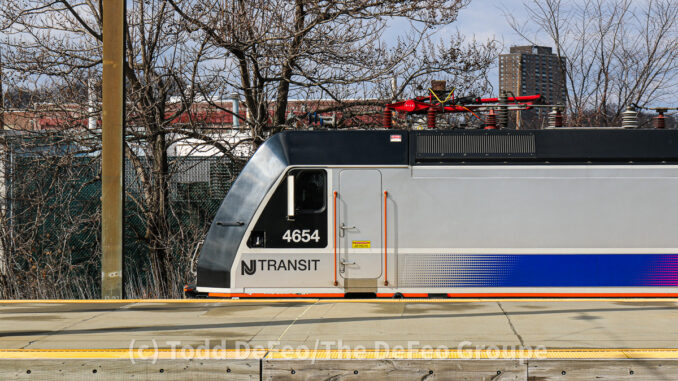
by Nikita Biryukov, New Jersey Monitor
May 10, 2025
Locomotive engineers at NJ Transit and the agency’s management remain at odds as stalled contract negotiations at an impasse over wages threaten to boil over into a disruptive strike in less than a week.
NJ Transit has argued that engineers are seeking extravagant salary hikes. But NJ Transit Brotherhood of Locomotive Engineers General Chairman Tom Haas told reporters in Newark Friday that the agency has overstated engineers’ pay and inflated the figures included in the union’s latest contract proposal by listing other forms of compensation as salary.
“It’s not been true, good faith negotiations on their part, and I think you see that with some of the PR they’ve done over the last couple weeks,” said Mark Wallace, the union’s national president, who would be the one to call a strike Friday.
In a separate press conference held across the street, NJ Transit CEO Kris Kolluri impugned Haas’s mental health and maintained the agency would not depart from an earlier contract offer agreed to by both bargaining teams but overwhelmingly rejected at a vote by union members last month.
“I’m worried about his health. I’m worried about his mental health,” Kolluri said of Haas.
When asked about those comments, Kolluri said he “was merely questioning his memory.”
NJ Transit’s locomotive engineers have been working under an expired contract since 2019, and years of bargaining have exhausted the extensive federal process for railway strikes.
The union could launch a job action after 11:59 p.m. May 15. A strike by engineers would effectively stop all agency trains on one of the country’s busiest commuter rail lines.
NJ Transit’s contingency plan for such a strike would see additional buses launched from four park-and-ride lots, but that plan would only capture about 20% of its daily riders, and at a cost of about $4 million per day, the agency has said.
On Friday, Haas said the difference between the two sides’ wage proposals was just over $4 million per year. He said the union asked for increases that are two percentage points higher than those in the deal rejected in April’s vote, from an average of 2.65% in eight increases over seven years to 4.625%.
“That means over the course of a week, should New Jersey Transit cause a work stoppage that lasts a week, that would exceed the cost difference between our proposal and theirs,” Haas said. “So, New Jersey Transit is, again, being a little cagey with the numbers here.”
Anthony Grieco, senior vice president of communications and customer experience at NJ Transit, said the union had requested three additional 5% increases in 2028, 2029, and 2030, years not covered under the rejected proposal.
When asked Friday about the difference in cost between the two proposals, Kolluri said $1.3 billion before acknowledging that figure includes pay for other workers and assumes the agency’s other unions would obtain similar increases.
NJ Transit’s proposed total spending on labor in the fiscal year that begins July 1 is $984.2 million, according to budget documents.
Grieco later said the union’s proposal, including the three extra years, would on average annually cost $11.8 million more than the rejected deal.
But “me, too” provisions in contracts with 12 of the agency’s 14 other unions could trigger matching wage increases for other unions at a cost of about $55 million more each year, Grieco said.
More than once Friday, Kolluri said he would not entertain proposals apart from the one the union’s members have already rejected.
“I will not be party to any deal other than the one that’s on the table,” he said, adding a larger increases could spur other unions to seek their own wage hikes.
The CEO argued the agency’s proposal would bring hourly pay for NJ Transit engineers to $49.82, about on par with rates at the Long Island Rail Road. But that figure includes one-time retroactive payments and non-salary compensation like overtime. Engineers at LIRR have been working under an expired contract since 2022.
The NJ Transit engineers union argued that figures the agency gave for their salaries are inaccurate.
Agency officials have said engineers are paid $135,402 on average and on Friday proffered payroll documents to support the figure. The documents list gross pay for 238 locomotive engineers (NJ Transit has about 420 engineers on staff). Agency staff said roughly 200 others had been excluded because they did not work at least 40 hours each week in 2024. Salaries for locomotive engineers listed across two categories on the state’s transparency website averaged to $113,853.
Haas said he would accept a contract that brought average base salaries — not total compensation — to $172,000.
“I’ll come upstairs and sign it right now. I will walk over to their building and avert a strike. If you’re willing to do $172,000 a year average earnings for engineers, we’ve got a deal,” Haas said.
Officials still have a path to avert a strike. Congress and President Donald Trump could act to avert a strike by passing and signing legislation to impose a tentative contract, as happened in December 2022, when President Joe Biden signed a bill to block a national rail strike over a sick leave dispute.
The National Mediation Board, which oversaw bargaining between the parties for more than four years, is holding a public interest meeting at which the two sides are to deliver statements on Monday (the board’s formal role as a mediator ended last June).
But sharp rhetoric and apparently growing animosity between the two camps could make an amicable resolution unlikely.
“He somehow thinks there is a better pot at the end of the rainbow,” Kolluri said, referring to Haas. “Let me be crystal clear: This is the deal that was offered, that he shook my hands on, that he negotiated, and now he has to live with his consequences. Let me tell you what that means: We are about to spend $4 million a day. That is the number that’s coming off their contract every day they’re on strike.”
New Jersey Monitor is part of States Newsroom, a nonprofit news network supported by grants and a coalition of donors as a 501c(3) public charity. New Jersey Monitor maintains editorial independence. Contact Editor Terrence T. McDonald for questions: info@newjerseymonitor.com.





